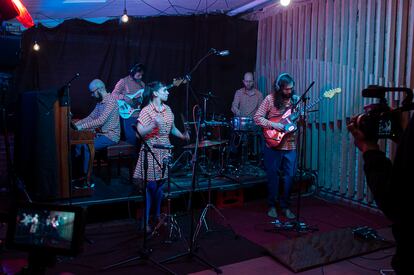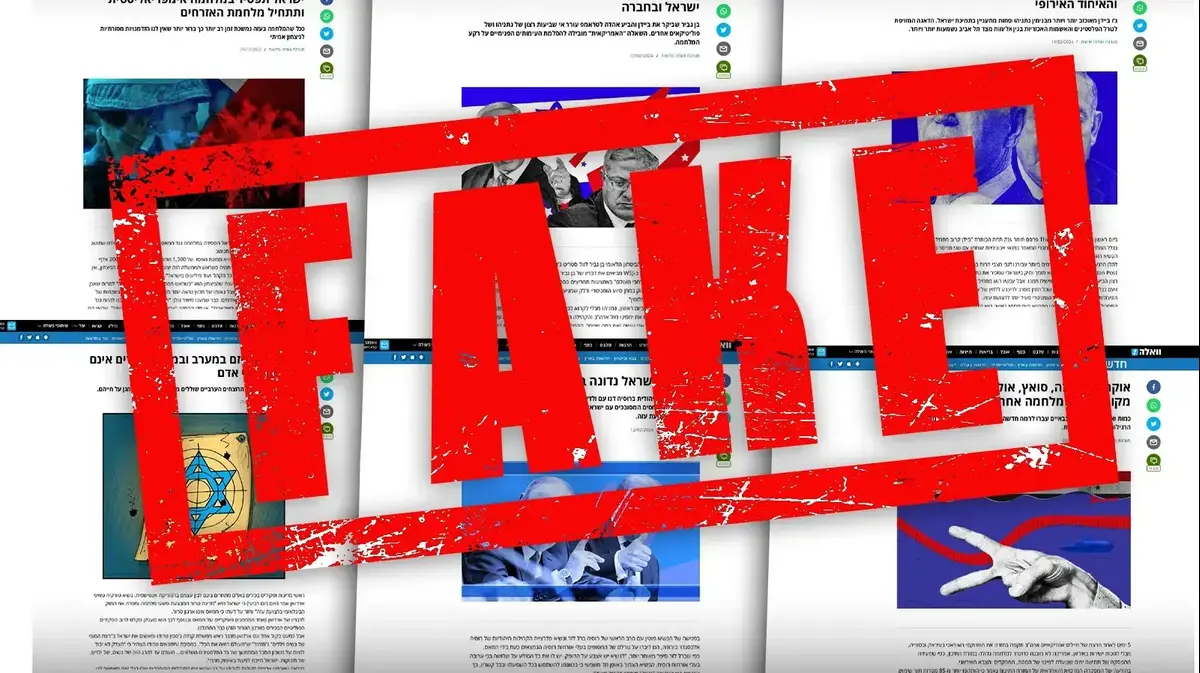A new album lands at the end of this week on the salsa dance floor, an album that fuses past rhythms from the seventies with the technological dystopias of the future.
It will be released by the record label Ansonia Records, a company that was born in 1949 among Latino immigrants from New York, and that in the following years produced several albums of merengue, jíbara, bomba, guaracha, mambo, boogaloo—but had not produced a record again. only album since 1990. On Friday, after more than 30 years, Ansonia Records will return to the dance floor with a salsa album.
"Brother from the future, I come looking for enlightenment," says the chorus of one of the songs on the new album, called
Metamorfosis
, by the old salsa group Renacimiento.
But there is a trick: Renaissance does not exist, never existed.
"It's a fake group and this is a fake cover," explains musician Eblis Álvarez, founder of the Colombian group Meridian Brothers, who had already experimented with various genres from cumbia to vallenato.
A group that is “tropical cannibalism”, says Álvarez.
This year Meridian Brothers decided to launch a group of salseros straight out of fiction, Renacimiento.
The members of Meridian Brothers pose for a portrait, in Bogotá (Colombia). Perla Hernández Galicia (Courtesy)
"The Renacimiento group is the typical name that musicians would give to a salsa group in the seventies," Álvarez tells EL PAÍS.
“For example, in the Nueva Trova there was talk of a political renaissance, but at the same time they combined this with the spiritual: when one listens to groups like La Columna de Fuego [from Bogotá] or Los Jaivas [from Chile], there was a pattern common: everyone was waiting for a rebirth of the soul, and of society”.
Although the Renacimiento group is made up of five artists on stage—María Valencia, Alejandro Forero, César Quevedo and Mauricio Ramírez, in addition to Álvarez—to record the album it was the founder who played all the instruments and also did the voice of the salsero that accompanies the songs. of the disk.
“My model, for many years, is a group that I have been listening to for a long time, Los Hermanos Lebrón, and that is the voice that I imitate on this album,” says Álvarez.
His higher pitched voice is transformed by a computer so that it sounds much deeper when he sings, much more like Los Lebrón.
The album has nine songs, some more similar to the slower old salsa, others to the faster contemporary.
And if one looks like a brief tribute to Pedro Navajas by Rubén Blades, several seem inspired by a Blade Runner movie.
Between the piano, the timpani and the percussion they are verses with the concerns of the 21st century: the loves that “communicate by algorithm”, or the threats of atomic bombs that “take us to the cemetery”.
Metamorfosis
, the single that is already public, begins with a man who wakes up turned into a robot and longs for the time when "there was an atmosphere in discos / Not like now, full of cameras, full of drones".
"I wanted it to sound like seventies salsa, I had to follow all the montunos, the forms, the voices, the way of singing, and everything is a copy," says Álvarez about the songs on the new album.
“There is no originality, or the originality of this is in being able to replicate the music as best as possible, but in terms of musical material there is nothing original because it is made with the collective unconscious of Latin America, of Colombia, of Latinos.
Here it is an extrapolation from the seventies to the current, and that speaks of transhumanism, as the subject of maximum concern that everything, absolutely everything, is now stuck in the
fucking
cell phone.
But the other retro aspect of this 'Renaissance' is that this album is the first in more than 30 years to be released by Ansonia Records, a record label founded in 1949 but forgotten despite the fact that it was one of the first labels founded by a Latino migrant in United States.
Puerto Rican Rafael Pérez, its founder, brought Dominican, Puerto Rican and Cuban musicians from Latin Harlem or the South Bronx, who had not found a home among American record companies, to various studios.
He produced his records before there was the mighty Fania who made New York salsa famous.
“Ansonia Records is a gem,” says Liza Richardson, an American DJ who worked for thirty years at a radio station in California, and who was also a music supervisor on series like
Narcos
or the movie
Y Tu Mama Tambien
.
In the early 1990s, Richardson found an Ansonia record in the station's archives and, fascinated by the label's production, she became close to the Pérez estate (who died in 1969).
She managed to buy the record label to reactivate it in 2020. She, and a small team, have started digitizing more than 5,000 Ansonia-produced songs, and an eighth of these are already on streaming platforms like
Spotify
.
“There is a lot of salsa, [the music of Puerto Rican Rafael] Cortijo, or an album by Gilberto Sextet, which is an album that we will release again in the fall, which is a unique album.
If his old vinyl version is found today it could cost about $300,” says Richardson.
Cortijo would later be the founder of the famous group El Gran Combo de Puerto Rico, but Ansonia also released two albums with Arsenio Rodríguez, a Cuban salsa pioneer;
or with Mon Rivera, a Puerto Rican who later played with Willie Colón for La Fania.
The musical group Meridian Brothers during a live session, recorded at the Matik Matik cultural space, in Bogotá (Colombia). Perla Hernández Galicia (Courtesy)
Souraya Al-Alaoui, manager of Ansonia Records, says that most of the artists chosen by the record label "focused on the Latin American diaspora, that was their base, they valued the traditional sounds of islands such as Cuba or Puerto Rico, and therefore that they were not trying to 'westernize'”.
Ansonia has one of the largest collections of jíbaro music, the son of the Puerto Rican mountains, where, for example, Ramito (Florencio Morales Ramos) was born, an artist who learned music listening to his mother sing while growing tobacco.
“Johnny Pacheco, founder of La Fania, started Ansonia Records, and Ansonia was an inspiration for what would later become La Fania,” says Al-Alaoui.
“In addition, Ansonia was a pioneer for being a label owned by a Latino, an independent label with a founding message of 'this is from us and for us.'
That's why he was an inspiration for what came after."
Over the years, La Fania grew and the seed of Ansonia Records disappeared.
The label never managed to promote its musicians in concerts in the same way as La Fania, and when the digital world started they did not set up a website or try to upload their music to
streaming
platforms .
It became a label that was only known by a small group of music lovers, like Liza Richardson or Eblis Álvarez.
“It is one of the most legendary labels in Latin music,” says this musician from Bogota, who for years has kept an Ansonia album by Dominican Ángel Viloria, known as the most successful merengue musician in New York in the 1950s.
"Ansonia Records, for me, was always like a secret weapon," says Richardson, who also kept the records he found from the label for more than 30 years.
“Now we hope to release a new record every year, and we love starting with this one from Meridian Brothers.
This is an album that looks towards the past, but tries to move towards the future, and that is exactly what we are trying to do: look towards the past in order, at some point, to be able to grow again, to flourish”.
Subscribe here
to the EL PAÍS newsletter on Colombia and receive all the key information on the country's current affairs.






/cloudfront-eu-central-1.images.arcpublishing.com/prisa/XI7CMCSW3RH5DMG7IBW6NJDCUI.tif)






/cloudfront-eu-central-1.images.arcpublishing.com/prisa/KMEYMJKESBAZBE4MRBAM4TGHIQ.jpg)

